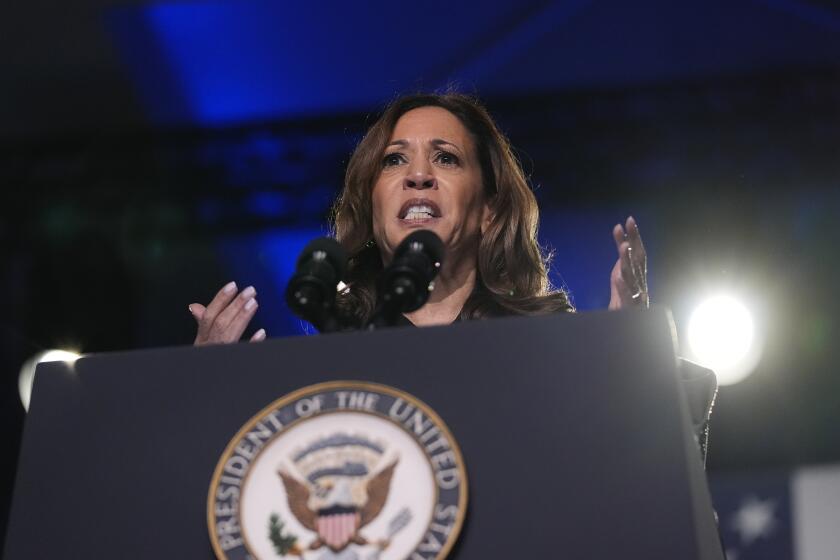Diplomacy Gives Bush Upper Hand Against Iraq
WASHINGTON -- Two months of bruising negotiations at the U.N. Security Council have left the Bush administration far better positioned to pursue its campaign to disarm Iraq, diplomats and analysts said Thursday.
By slogging through the process and making concessions to a world body it has often criticized, the administration has restored credibility with potential allies who were outraged by its initial argument that it needed no international mandate to attack Iraq, analysts said.
The goodwill the United States has fostered should help if Iraq refuses to comply with the resolution and the Bush administration returns to the Security Council and assembles an international coalition for a war against Iraqi President Saddam Hussein, they said.
At the same time, the negotiation process has forced each council member government to confront the Iraq problem, and ultimately to agree that Hussein was not complying with disarmament obligations, that that was unacceptable and that meaningful inspections were essential, a senior U.S. administration official said Thursday.
“It clearly puts the ball in Iraq’s court,” the official said. “The international community ... is saying, ‘OK, Iraq, we got these Americans to give you one last chance, now over to you.’ ”
President Bush said Thursday that he was optimistic after telephone calls with French President Jacques Chirac and Russian President Vladimir V. Putin that the latest version of the Iraq resolution, which was jointly sponsored by Britain, would pass today. Diplomats expect a wide margin of support, if not unanimous approval.
But some hawkish Republicans, who opposed taking the resolution to the United Nations in the first place, still hope the resolution will be voted down.
A defeat at the Security Council, argued conservative scholar Frank Gaffney, would relieve Bush of the need to clear his moves with the United Nations and leave him free to assemble a coalition of nations willing to go to war against Iraq.
Gaffney and other hawks argue that the final resolution -- which precludes immediate U.S. military action against Iraq -- will tie the United States to a bureaucratic and ineffectual U.N. inspection process.
The hunt for any weapons of mass destruction may drag on well into winter, the optimum time for a ground attack on Iraq, and ultimately fail, the hawks argue.
“It will buy Saddam breathing room, it will embolden him, and it will make it more difficult to take military action,” Gaffney said. “If we give Saddam another year, there’s no telling how much more serious this problem will have become.”
Liberals worry that a double victory this week -- at the polls and the U.N. -- will embolden Bush.
“It will be interesting to see how many members of the Security Council will stand up to Uncle Sam or decide to get on the war train when it becomes irrevocably clear that it’s leaving the station,” said Richard K. Betts, director of the Institute of War and Peace Studies at Columbia University.
“After the election triumph, it’s hard to believe Bush won’t feel like he’s on a roll and be even harder to stop,” Betts said, referring to Republican gains in the House and Senate.
Bush gave a nuanced nod to the concerns of both political camps Thursday by insisting that “war is not my first choice ... it’s my last choice,” but also emphasizing that if the U.S. finds war necessary, it will “move swiftly with force to do the job.”
A successful U.N. resolution will make it easier for Bush to weather charges of “cowboy” unilateralism, analysts said.
“The public was clearly very worried about the U.S. taking on Iraq on its own,” said David Malone, president of the International Peace Academy in New York, a think tank. “With this resolution comes the assurance that if the administration in the future does decide to take on Iraq, it will be possible for the U.S. to marshal a credible coalition.”
U.S. diplomats spent countless hours haggling over phrases, verb tenses, even the words “and” and “or” -- and hundreds of hours on the telephone lobbying senior diplomats, not just from the 15 Security Council member countries but also from other nations.
Granted, domestic and international political realities spurred the administration to engage in the diplomatic heavy-lifting. The congressional authorization Bush won in October to use force to disarm Iraq specifies that the administration should seek a Security Council resolution. America’s top ally against Iraq, British Prime Minister Tony Blair, needed a U.N. resolution to keep his own Labor Party from rebelling. Winning military cooperation from other nations would be difficult if not impossible without a U.N. mandate. And finally, the U.S. cannot afford to ignore the U.N. now if it expects help rebuilding Iraq after a war.
But the willingness to stick it out was seen as a victory for pragmatists over ideologues within the administration.
“Nobody likes spending two months banging your head against the wall in New York,” the senior administration official said. “It’s not fun. Multilateralism is not easy. But it’s necessary.”
Bush also signaled Thursday that upholding the authority of the Security Council has become a goal.
“When they pass this resolution, which I hope they do tomorrow, it shows that the U.N. is beginning to assume its responsibilities to make sure that 11 years of defiance does not go unanswered,” the president said. “It’s very important that the U.N. be a successful international body, because the threats that we face now require more cooperation than ever.”
Ivo H. Daalder, a National Security Council official in the Clinton administration and frequent Bush administration critic, praised the administration’s handling of the negotiations.
“They have stuck to the fundamental principles you need to stick to and maneuvered with language that has subtly changed the meaning of the resolution over time in a way that gives as much as possible without fundamentally undermining [Bush’s] principles,” Daalder said.
Although the resolution does not preclude U.S. military action, it does say that Iraqi violations must be reported back to the Security Council.
The thorniest question for the Bush administration is how it will handle the deliberations if Iraq does not comply and the council reconvenes “to consider the situation,” as the resolution demands. How long would the “discussions” take, and would Russia, China or other countries try to delay or deter the U.S. from attacking Iraq?
Daalder argued that the Security Council would not succeed in holding Bush back.
The resolution’s language gives Hussein “a final opportunity” to comply with U.N. disarmament resolutions or face “serious consequences,” he pointed out. “It doesn’t say ‘two final opportunities,’ ” Daalder said. “The president is likely to pull the plug at the first sign of noncompliance. We’ll walk.”
If “the Europeans think by ‘consultations’ the administration is giving them a veto of further U.S. military action,” said Lee Feinstein of the Council on Foreign Relations, “then they misunderstand the nature of the deal they cut.”
*
(BEGIN TEXT OF INFOBOX)
Shifting rationale
From Iraq’s suspected efforts to build weapons of mass destruction to its defiance of the U.N. and alleged ties to terrorism, the Bush administration’s rationale for its campaign against Saddam Hussein has shifted repeatedly since summer. Quotes from President Bush, Vice President Dick Cheney, Secretary of State Colin L. Powell, Defense Secretary Donald H. Rumsfeld and National Security Advisor Condoleezza Rice:
July 8: “It’s the stated policy of this government to have a regime change... I do firmly believe that the world will be safer and more peaceful if there’s a regime change in that government.” -- Bush
July 30: “Are there Al Qaeda in Iraq? Yes.” -- Rumsfeld
Aug. 16: “There should be no doubt in anybody’s mind that this man is thumbing his nose at the world, that he has gassed his own people, that he is troubling his neighborhood, that he desires weapons of mass destruction.” -- Bush
Aug. 26: “Many of us are convinced that Saddam Hussein will acquire nuclear weapons fairly soon. Just how soon, we cannot really gauge.” -- Cheney
Sept. 1: “The president has been clear that he believes weapons inspectors should return. Iraq has been in violation of these many U.N. resolutions for most of the last 11 or so years. And so, as a first step, let’s see what the inspectors find.” -- Powell
Sept. 9: “We are especially concerned about Iraq because of the developments we see with respect to his weapons of mass destruction, because he has in the past, for example, had a relationship with terrorist organizations, has provided sanctuary in Iraq for terrorist organizations of various kinds, and because of this continued failure over the years of the international community to be able to cope with this problem.” -- Cheney
Sept. 11: “The $25,000 that he’s paying to suicide bombers, that he paid to Hamas suicide bombers, one of whom decided to set off a bomb at Hebrew University and to kill several Americans in the process, how much of a link do you want? When you look at Saddam Hussein and the fact that he tried to assassinate the former American president, George H. Bush, Saddam Hussein has a long history here.” -- Rice
Sept. 17: “Remember, the issue is not inspectors, the issue is in the first instance disarmament, and then there are many other issues at stake here, having to do with the treatment of minorities in the country, having to do with terrorism, having to do with a number of other issues ...” -- Powell
Sept. 25: “We clearly know that there were in the past and have been contacts between senior Iraqi officials and members of Al Qaeda going back for actually quite a long time.” -- Rice
Sept. 27: “The Congress of the United States passed legislation and President Clinton’s policy and the Congress’ policy, the country’s policy, was regime change back as far away as 1998 ...” -- Rumsfeld
*
Sources: NBC, CNN, CBC, ABC, PBS, Federal News Service, Times reports
*
Times staff writer Maggie Farley at the United Nations contributed to this report.
More to Read
Sign up for Essential California
The most important California stories and recommendations in your inbox every morning.
You may occasionally receive promotional content from the Los Angeles Times.










